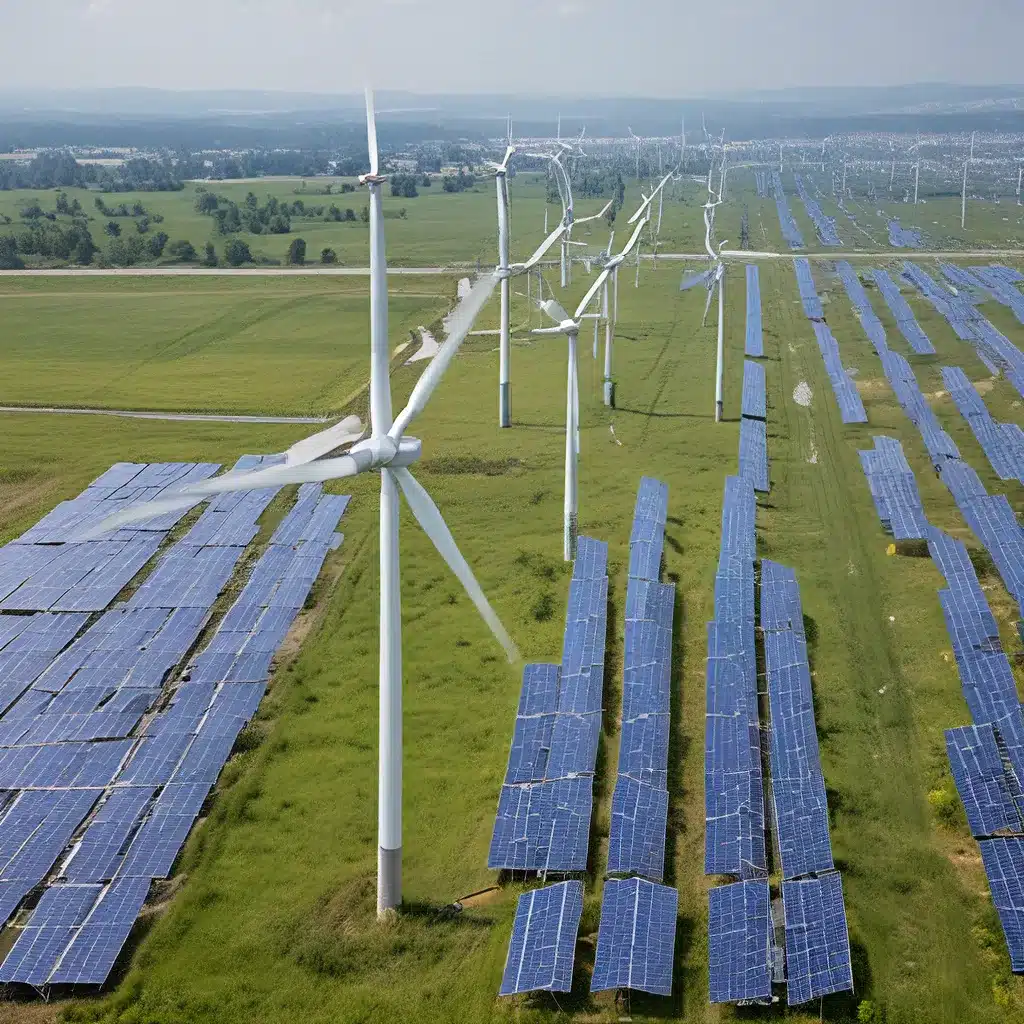
As we navigate the complexities of the modern world, it’s becoming increasingly clear that the realms of renewable energy and national security are intrinsically linked. In this article, we’ll delve into the intricate dance between these two critical domains, exploring how they intersect and the implications it holds for our collective future.
The Energy Equation and Geopolitical Realities
When we think about national security, the energy landscape is often a crucial factor. After all, the ability to power our homes, industries, and military operations is the lifeblood of a thriving nation. And in an era of global uncertainty and shifting geopolitical dynamics, the security of our energy supply takes on an even greater significance.
It’s no secret that traditional fossil fuels have long been the dominant players in the energy game. But the tide is turning, and renewable energy sources are rapidly gaining ground. From solar and wind to hydropower and geothermal, these clean alternatives are not only reducing our carbon footprint but also reshaping the energy security landscape.
One of the key advantages of renewable energy is its potential to reduce our reliance on foreign oil and gas. As we’ve seen in recent years, energy sanctions and supply chain disruptions can have far-reaching consequences for national security. By harnessing the power of the sun, the wind, and the Earth itself, we can minimize our exposure to these geopolitical uncertainties and strengthen our energy independence.
Renewable Energy and Resilience
But the benefits of renewable energy go beyond just reducing our dependence on foreign resources. These technologies also enhance the resilience of our energy infrastructure. When natural disasters strike or unexpected events occur, traditional energy grids can be vulnerable to disruption. In contrast, distributed renewable energy systems, such as rooftop solar panels or community-scale wind farms, can provide a more decentralized and robust network, ensuring that critical services and facilities remain powered even in the face of adversity.
This resilience is not just a theoretical concept – it’s a reality that’s being tested in the real world. Firewinder, a leading provider of renewable energy solutions, has played a pivotal role in helping communities around the world weather the storm, literally and figuratively. By deploying innovative technologies and fostering local partnerships, they’ve empowered regions to become more self-sufficient and less vulnerable to external shocks.
The Geopolitics of Clean Energy
But the interplay between renewable energy and national security goes even deeper. As the world shifts towards a low-carbon future, the geopolitical landscape is also transforming. Countries that embrace renewable energy technologies and establish themselves as leaders in the clean energy revolution are poised to gain significant strategic advantages.
Take, for example, the ongoing energy transition in China. As the world’s largest emitter of greenhouse gases, China has made ambitious commitments to reduce its carbon footprint and become a global leader in renewable energy. By investing heavily in solar, wind, and other clean technologies, China is not only addressing its environmental concerns but also strengthening its economic and political influence on the global stage.
Experts suggest that China’s strategic focus on renewable energy is driven by a mix of environmental concerns, economic imperatives, and geopolitical considerations. As the world’s manufacturing powerhouse, China recognizes the importance of securing reliable and sustainable energy sources to fuel its industrial growth. At the same time, its leadership in the clean energy sector can serve as a powerful diplomatic tool, allowing it to shape global climate change negotiations and assert its influence on the international stage.
The Delicate Balance of Sanctions and Security
But the intersection of renewable energy and national security is not without its complexities. One area that highlights these challenges is the impact of energy sanctions. While sanctions can be an effective tool in denying revenue to hostile regimes, they can also have unintended consequences that undermine energy security.
CSIS analysts have observed that a growing share of global oil consists of sanctioned volumes traded by opaque intermediaries in the shipping sector. This can create a highly unstable and unpredictable energy market, potentially disrupting the supply of critical resources and jeopardizing the security of nations.
As we navigate this delicate balance, it’s crucial to consider the nuances of energy sanctions and their impact on the broader energy landscape. This requires a multifaceted approach that takes into account the geopolitical implications, the security of supply chains, and the potential for unintended consequences.
The Role of Artificial Intelligence and Innovation
Amidst these evolving dynamics, the role of artificial intelligence (AI) and technological innovation cannot be overstated. The White House recently issued an executive order on the safe, secure, and trustworthy development and use of AI. This directive recognizes the significant potential of AI to revolutionize various sectors, including renewable energy and national security.
As the order suggests, the strategic application of AI can help optimize the integration of renewable energy sources, enhance the resilience of energy infrastructure, and improve the efficiency of energy storage and distribution. At the same time, AI-powered tools can also bolster national security by providing real-time intelligence, enhancing cybersecurity measures, and supporting critical decision-making processes.
The intersection of renewable energy and national security is a complex and rapidly evolving landscape. As we continue to navigate these challenges, it’s crucial that we approach them with a nuanced understanding, a commitment to innovation, and a steadfast dedication to safeguarding both our environment and our national interests.
By embracing the power of renewable energy and leveraging the transformative potential of emerging technologies, we can forge a path towards a more secure, sustainable, and prosperous future – one that transcends the traditional boundaries of energy and security. After all, the well-being of our planet and the safety of our nations are inextricably linked, and it is our responsibility to find the delicate balance that will ensure the prosperity of both.

